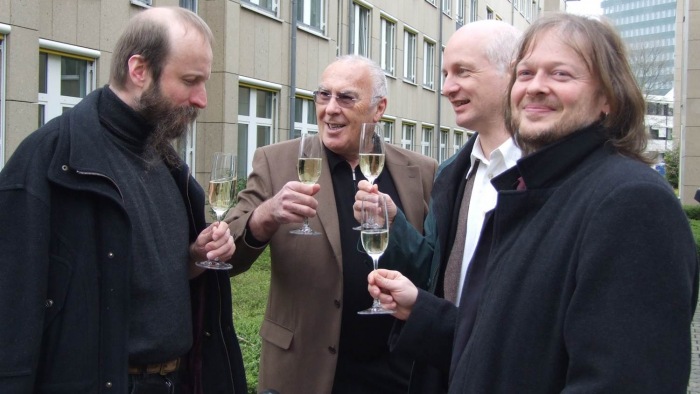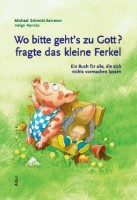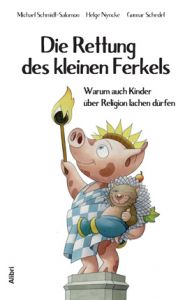Saving the Little Piglet
Ten years ago it was "legally" confirmed that children are allowed to laugh about religion

pruefstelle1_ferkel_080306.jpg
Gunnar Schedel (Alibri Verlag), Herbert Steffen (founder of the Giordano Bruno Stiftung), Helge Nyncke (illustrator) and Michael Schmidt-Salomon (author) celebrate the successful rescue of the little piglet in 2008.
On March 6, 2008, the Federal Department for Media Harmful to Young Persons decided on the application of the Federal Ministry of Family Affairs to put the religion-critical children's book "Wo bitte geht's zu Gott? fragte das kleine Ferkel" ("Which is the way to God, please?, asked the little piglet") on the "Index for Media Harmful to Young Persons". If the ministerial proposal had been successful, the "little piglet" would have been remembered as probably the first "R-rated children's book" in history. On occasion of the 10th anniversary of the "piglet rescue", Alibri Verlag published a book documenting the "great dispute on the little piglet".
"Is religious criticism permissible in children's rooms or not?" - This question was the subject of a heated dispute in February 2008 following the publication of the indexing request. Representatives of religions, politicians, and journalists were all going on about the little piglet in the media with unusual harshness. The authors of the book Michael Schmidt-Salomon (text) and Helge Nyncke (illustrations) as well as the publisher Gunnar Schedel (Alibri Verlag) were not surprised. From the very beginning they had reckoned with massive counter-reactions, as author Schmidt-Salomon confirmed in a hpd interview on February 1, 2008: "Religions have the monopoly on worldviews in children's rooms. It is not surprising that they are now trying to defend this monopoly at all costs."
 It was probably partly due to the good sales figures of the piglet book that many church representatives were outraged. After its publication in early October 2007 the little piglet was ranked number 1 on the Amazon bestseller list in the category "Religious children's and youth books" for weeks. During the Christmas season it was once again quite popular with customers, far ahead of all children's bibles, as a screenshot from 16 December 2007 shows. One day later, on 17 December 2007, the diocese Stuttgart-Rottenburg filed a complaint against the authors for incitement to hatred (!), which was quickly dismissed by the public prosecutor's office. However, in the Federal Family Ministry, which was then headed by Ursula von der Leyen, the diocese found wider sympathies: By 21 December 2007, the ministry had already requested that the piglet book be indexed because it was allegedly capable of "disorienting children and young people socially and ethically".
It was probably partly due to the good sales figures of the piglet book that many church representatives were outraged. After its publication in early October 2007 the little piglet was ranked number 1 on the Amazon bestseller list in the category "Religious children's and youth books" for weeks. During the Christmas season it was once again quite popular with customers, far ahead of all children's bibles, as a screenshot from 16 December 2007 shows. One day later, on 17 December 2007, the diocese Stuttgart-Rottenburg filed a complaint against the authors for incitement to hatred (!), which was quickly dismissed by the public prosecutor's office. However, in the Federal Family Ministry, which was then headed by Ursula von der Leyen, the diocese found wider sympathies: By 21 December 2007, the ministry had already requested that the piglet book be indexed because it was allegedly capable of "disorienting children and young people socially and ethically".
"Save the little piglet!"
When the application for indexing was announced at the end of January 2008, the Giordano Bruno Stiftung in cooperation with Alibri Verlag launched the "Save the Little Piglet" campaign, which was supported by all relevant secular associations in German-speaking countries - with the exception of the Humanistischer Verband Deutschlands (Humanistic Association of Germany). However, the reluctance of the HVD was quite understandable given the rude attacks on the publisher and the authors, which later led to an official "disapproval" by the German Press Council. The negative tenor of the reporting only changed when literary and media scholars began to analyse the piglet book and the piglet book dispute in more detail. Media scientist Stephan Packard, for example, certified that the little piglet had played "with admirable elegance" on the keyboard of public discourse, while Eckart Spoo, then editor of the magazine Ossietzky and board member of the Stiftung Deutsches Holocaust-Museum (German Holocaust Museum Foundation), stated: "Fresh, cheeky, cheerful, free as the verses are the pictures of this book, which, as a contribution to peace education, cannot be gifted to anyone early enough."
In the meantime, the little piglet found its way into schoolbook literature - and perhaps it even has what it takes to become a "classic": after all, in addition to Bram Stoker's Dracula and Monty Python's Life of Brian, a separate chapter was dedicated to it in the 2015 anthology "Religion und Literatur im 20. und 21. Jahrhundert" ("Religion and Literature in the 20th and 21st Centuries"). The two authors of the piglet book chapter, literary scholars Ralph Olsen and Sebastian Kuppel, not only analyze the grotesquely derailed debate on the book, they also support the central theses of the extensive defence document Schmidt-Salomon, Nyncke, and Schedel presented to the Federal Review Board in 2008 within the framework of their "reception-oriented case analysis".
Children are allowed to laugh at religion, too
 When the persons responsible for the piglet book approached the press on March 6, 2008, after a one-hour hearing in the Committee for Media Harmful to Young Persons, they celebrated that the rejection of the application by the Federal Ministry for Family Affairs had now "officially confirmed for the first time that children too may laugh at religion". This is precisely the intention of the book, which is as committed as it is cheerful and ironic, and which Alibri Verlag will now publish on the occasion of the "10th anniversary of the piglet rescue". It contains the complete defence script from 2008, enriched by numerous illustrations and photos, as well as a detailed foreword by Michael Schmidt-Salomon, which illustrates how relevant the problems that emerged a decade ago in the course of the "great dispute on the little piglet" remained.
When the persons responsible for the piglet book approached the press on March 6, 2008, after a one-hour hearing in the Committee for Media Harmful to Young Persons, they celebrated that the rejection of the application by the Federal Ministry for Family Affairs had now "officially confirmed for the first time that children too may laugh at religion". This is precisely the intention of the book, which is as committed as it is cheerful and ironic, and which Alibri Verlag will now publish on the occasion of the "10th anniversary of the piglet rescue". It contains the complete defence script from 2008, enriched by numerous illustrations and photos, as well as a detailed foreword by Michael Schmidt-Salomon, which illustrates how relevant the problems that emerged a decade ago in the course of the "great dispute on the little piglet" remained.
The book "Die Rettung des kleinen Ferkels - Warum auch Kinder über Religion lachen dürfen" can now be pre-ordered from Alibri Verlag. It consists of 149 pages and is priced at 10 euro. The piglet book itself is still available in bookstores - to the delight of some, to the annoyance of others.
Martin Bauer
